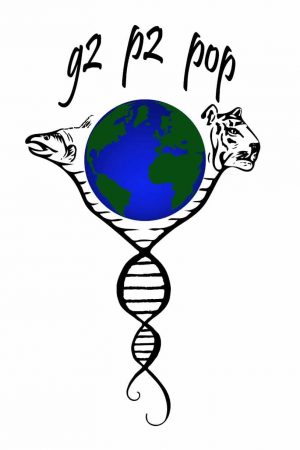
What does g2p2pop mean? This is an abbreviation for our goal of modeling genomes to phenomes to populations in a changing climate. Genomes to phenomes to populations=g2p2pop
Delve into g2p2pop
The Challenge
We are currently facing massive changes in climate patterns which will compromise organismal fitness and population persistence. In fact, many species are already heavily impacted, and we are witnessing consequences to species from climate change including changes in spatial distributions, changes in phenology, and extinctions.
In order to be able to predict how systems might change and design effective conservation plans, we first need to fully understand how environmental change impacts biological systems.
Characteristically, these systems exhibit emergent properties and are capable of change through phenotypic plasticity, microevolutionary processes, or both. In a changing environment, animals can persist and even thrive by either responding behaviorally or through alterations in physiology or morphology. The relative importance, mechanisms, and timeframe of organismal adaptation and acclimation in species and populational resiliency and vulnerability are unknown.
Modeling
Given the predicted and accelerated rate of global climate change, there is increased urgency to harness the power of data across the biological hierarchy coupled with complex systems modeling approaches in order to predict the organismal and population responses to a changing environment.
Empirically testing how different aspects of global climate change impact species is logistically and practically impossible. Modeling provides an alternative approach that can be used to identify the species at highest risk from global change through simulating a number of possible scenarios and cost-benefit analyses. Only through such an approach can we develop mechanism-based management and conservation strategies for the many species at risk.
The first task is to understand how lower level processes translate to population-level responses. Capturing that link is crucial for tackling the challenge of predicting how populations will respond to global climate change, and ultimately will form a basis for developing management strategies that will undoubtedly be required to ensure persistence of many populations.
The Expertise Network
It is well beyond the capacity of an individual or even a single scientific discipline to address the Grand Challenge of genomes to phenomes to populations.
Quite possibly, the biggest hurdle to this understanding is that the scientific community tends to operate in veritable silos of expertise. g2p2pop will serve as a platform for building interdisciplinary collaborations and providing training to empirical and modeling scientists.
The overarching goal of this RCN is to bring together a diverse collection of empiricists and modelers, groups that do not often interact. This interaction is essential to elucidate the functional complexity of life, an understanding that holds the potential to serve as the basis for quantitative models to predict resilience and vulnerability of vertebrates in a changing world.